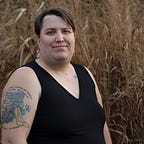Two or Three Things I Know For Sure About Grief & Organizing
*hat tip to Dorothy Allison.
Two or three things I know for sure:
Many people will die and we are collectively and intimately about to get familiar with death and grief at a scale that is impossible to comprehend. For all the things we have power over, this is not one of them. There are leaders who could have lessened that death, governance that could have chosen to prioritize increasing collective over profits and racial capitalism. We can still work hard to lessen the amount of death. But we have no magic wand to go back and change the past and no way to make sure no one dies.
There will be life after this pandemic.
What that life looks like, I don’t know. But I do know that it will not be like before. And for those of us who can, our responsibility is to shape what that life and what common sense will look like towards something resembling the world we are longing for.
Two or three things I know for sure about grief:
Grief is something we will all feel at multiple points in our lives. It’s a part of the experience of living, loving, and being connected to others. And grief in the COVID-19 pandemic is different, we are practicing isolation in order to prevent more death. We are grieving together in online memorials, unable to physically comfort each other, unable to share that bodily reminder that we are not alone.
Grieving death never ends. Sure, it changes shape and form and impacts us differently over time. But it never ends. I know for sure that it hasn’t for me.
Grieving death changes us, even if we want to believe it doesn’t. We are not the same people we were before grief. And if it impacts families, organizations, movements, and entire communities, those larger units of connection are not the same either. We are different people, new teams, new configurations of family who are stumbling to figure out what life and connection looks like now. We are about to figure out what that looks like at scale.
Two or three things I know for sure about grief and being an organizer:
Life doesn’t stop just because grief hits, making a wreckage of us and forcing us to re-orient and re-understand ourselves, our relationships, and the world. And just like life, our movement building work doesn’t stop either.
Internalized capitalism, ableism, and patriarchy alongside deep cultural individualism often has us believing that we need to stuff our feelings down and keep it moving or that self-care and tending to grief means we need to step back and handle that alone, get our shit together, and come back to our movements and organizations when we’re ready. What would it look like to give ourselves more choices in this moment? To remind each other and ourselves that we can be gracious with each other, acknowledge the truths that we are grieving wreckages and messes navigating what life looks like now and also that we are organizers and movement builders who have skills, wisdom, creativity, and strategy to bring to the table?
We don’t need to reinvent the wheel. This is not the first time movement organizers have had to face into collective grief and death. For example, what are the lessons on grief and organizers that queer & trans leaders who lived through the HIV/AIDS crisis can teach us?
Two or three things I know for sure about grief, being an organizer, and staying in the work:
Grief is disorienting. What we imagined about our present or our future has changed, how we relate to others might be changing, and it can make us question the point of our work. I know it has made me question that. In the first two weeks of this pandemic, I felt this deep sinking feeling: my certainty that I would be a parent someday went away. My mind was wracked with the question, what if my longing to be a parent doesn’t make sense any more given the pandemic, social distancing, and how governance might change? I still don’t know.
Even in the disorientation of grief, we can come back to what matters most to us and the world we most long for. In my experience, that hasn’t always changed. But the path to get there, what I do and practice, and how I understand it sometimes does. It’s helpful if we can feel for a sensation in our bodies of what that longing evokes in us. It’s a way for us helps us come back to that feeling of some kind of North Star to help us keep moving even as things change.
Two or three things I know for sure about why stay in this work in this midst of everything happening in this moment:
We — ourselves and our communities — are worth the world we are longing for. If we believe that no bodies are disposable, then owe it to ourselves, each other, and our ancestors to take seriously the task of what it will take to make that true at scale.
What I know for sure is that if we aren’t accounting and making room for grief, how it will impact us in the work, and how we move forward — we’ll only have part of the strategy and organizing practice we will need to weather this pandemic.
What I know for sure is that with support, we can grieve and organize at the same time.
